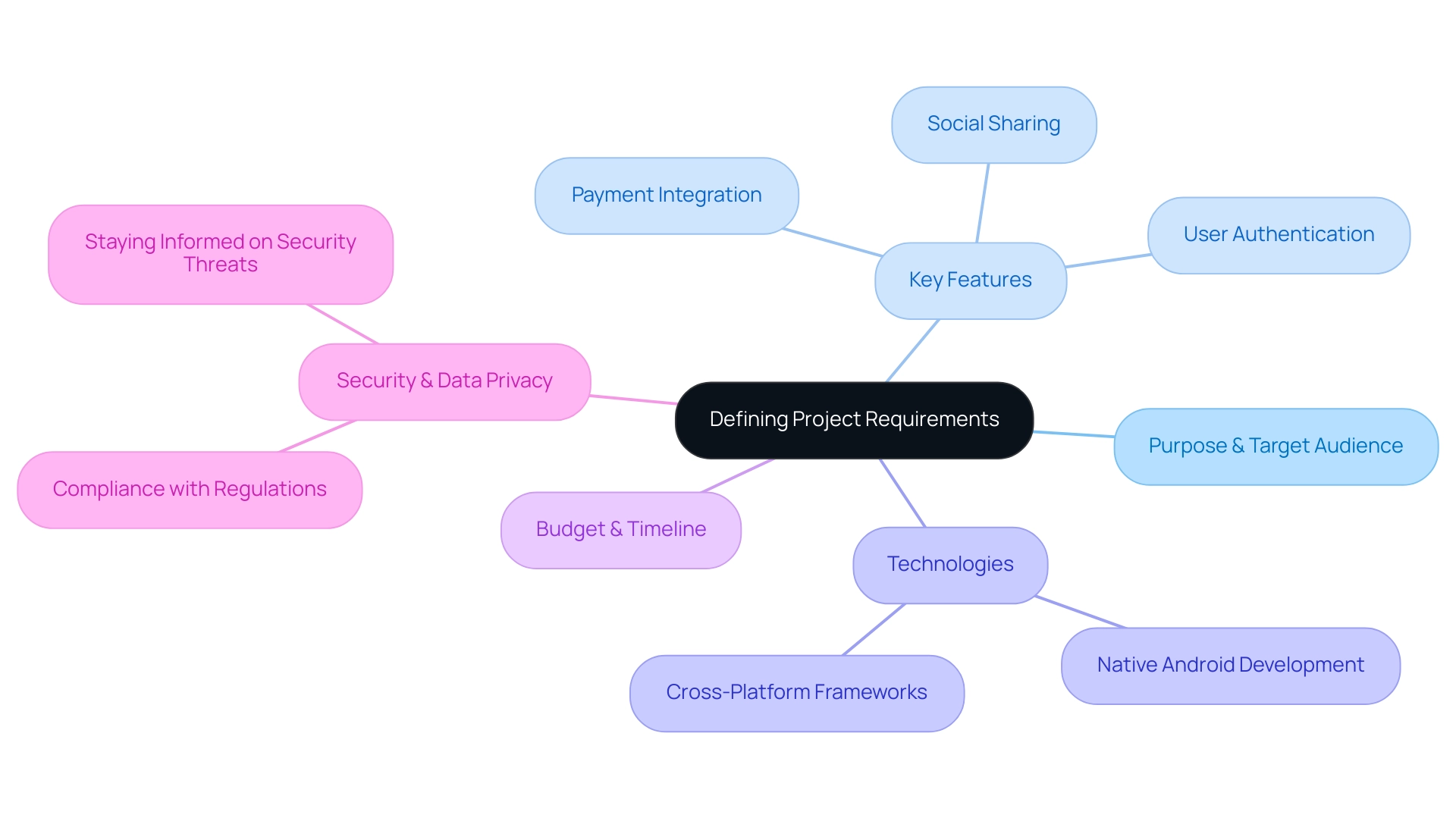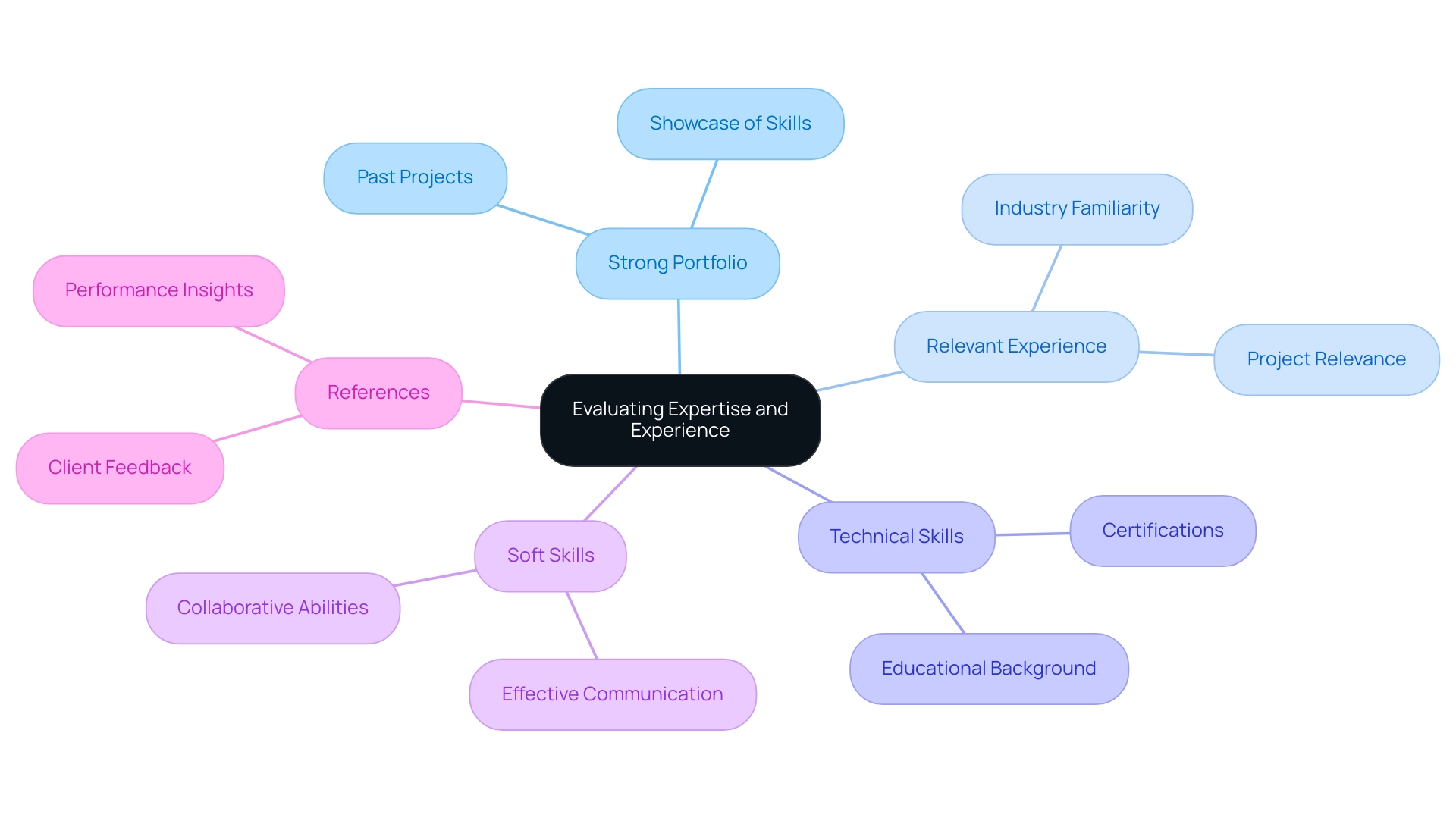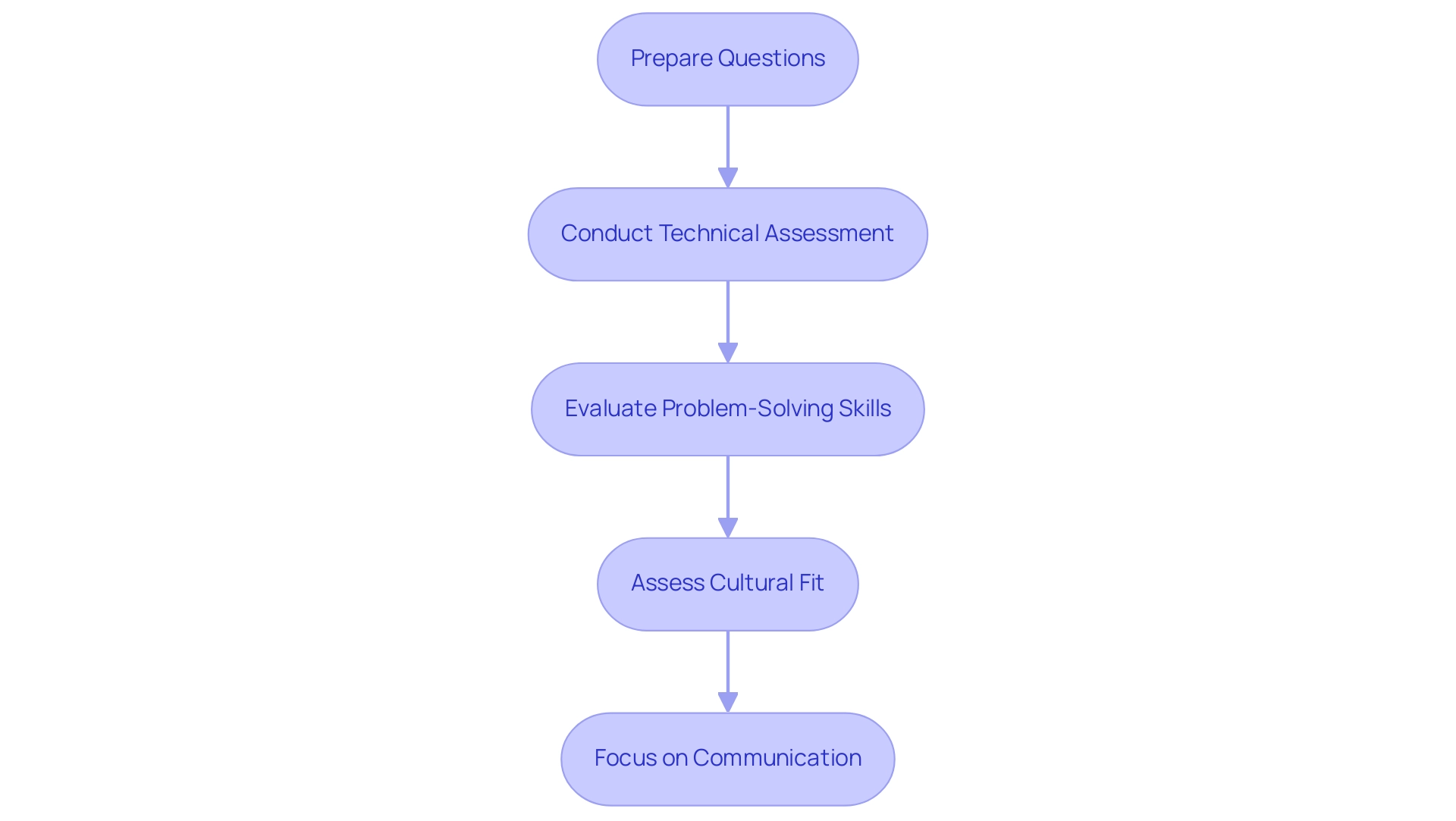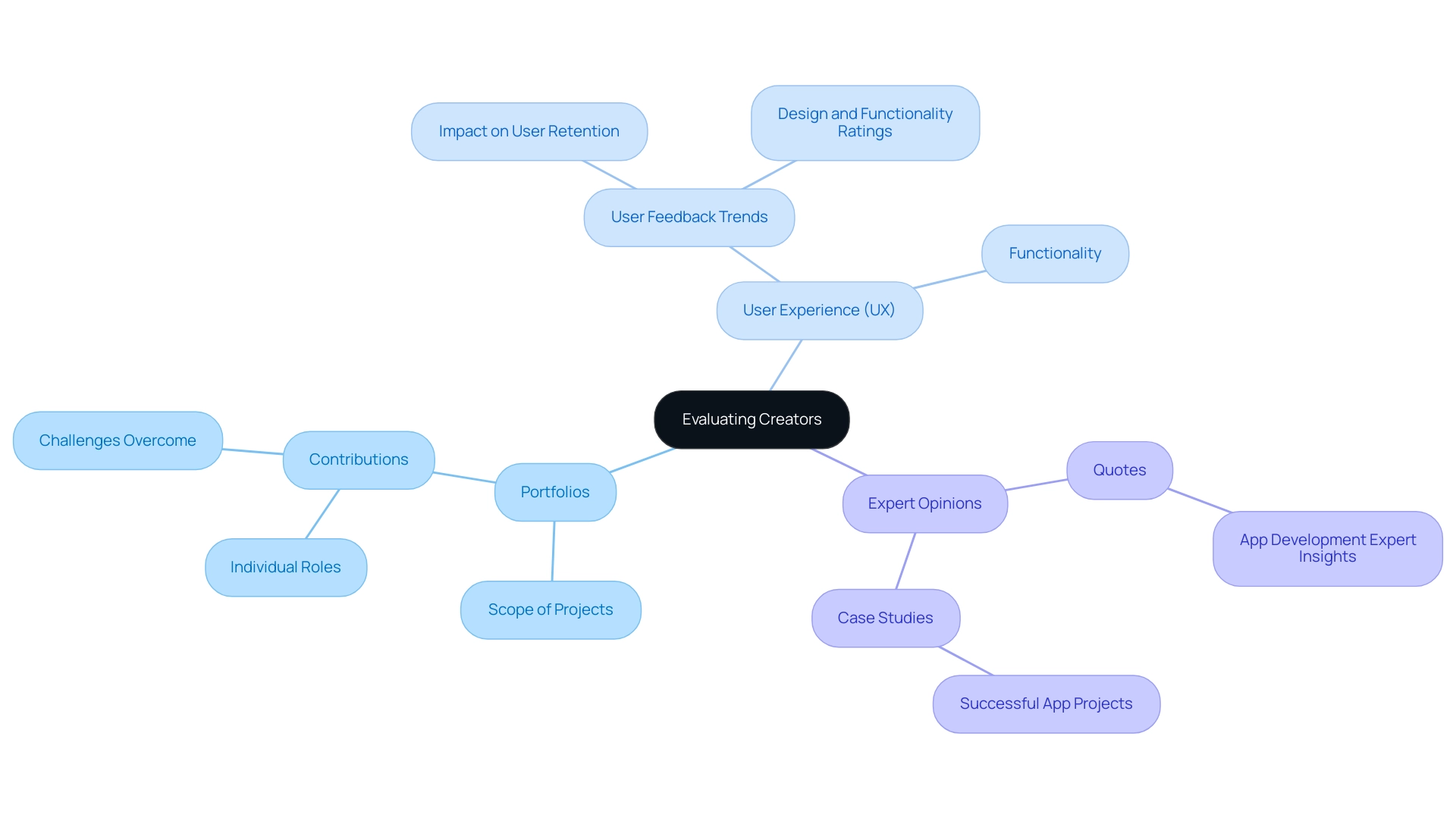Introduction
In the competitive landscape of mobile app development, the success of a project hinges on meticulous planning and strategic execution. As the demand for innovative applications continues to surge, understanding how to define project requirements, evaluate developer expertise, and conduct thorough assessments becomes paramount.
This article delves into the essential steps for launching a mobile application:
- Outlining its purpose
- Identifying the target audience
- Ensuring that the selected developers possess the right skills and experience
With insights into effective interviewing techniques and the importance of reviewing portfolios, this guide aims to equip stakeholders with the knowledge needed to navigate the complexities of app development and achieve their desired outcomes.
Defining Your Project Requirements
To successfully launch your mobile application, it is essential to begin with a comprehensive outline of your app's purpose and target audience. Clearly defining these elements not only shapes the creation process but also aligns your vision with potential developers. Consider incorporating key features such as:
- User authentication
- Payment integration
- Social sharing capabilities
With estimates indicating that there will be 40 billion IoT devices globally by 2025, the significance of strong mobile app creation in a connected world is undeniable. Recent trends suggest that by 2024, a significant portion of app creation initiatives will emphasize robust feature sets that enhance user experience and engagement. Additionally, record any particular technologies you wish to employ, whether that involves native Android creation or cross-platform frameworks, as these selections will significantly affect the approach.
Establishing a well-defined budget and timeline is essential for efficient management and will assist developers in evaluating their ability to fulfill your needs. A survey revealed that 75 percent of executives view competition between business functions and digital projects as a primary barrier to growth, underscoring the need for clarity and focus in app requirements. Additionally, with CI/CD pipelines being utilized by 82% of Agile teams, it is vital to ensure consistent software delivery throughout the app development process.
Lastly, considering security and data privacy is critical, especially in sensitive sectors like healthcare and finance, as those involved must stay informed about security threats and best practices. This organized method acts as a reference point during the process to hire an android app development company, promoting alignment with your vision and ensuring that both you and your team are on the same page from the outset.

Evaluating Expertise and Experience
When looking to hire an android app development company, prioritize those with a strong portfolio that effectively showcases their skills in past Android projects. Seek individuals who possess relevant experience within your specific industry and demonstrate familiarity with the latest technologies shaping app development. Evaluating their technical skills can be accomplished by reviewing certifications or their educational background, which often reflects a commitment to continuous learning in a fast-evolving field.
Furthermore, the importance of soft skills cannot be overstated; effective communication and collaborative abilities are critical for fostering a successful partnership. To gain deeper insights into a programmer's reliability and performance when you hire an android app development company, request references and actively follow up for feedback regarding their previous clients' experiences. This comprehensive approach ensures you choose professionals who not only excel technically but also align with your project’s collaborative dynamics.
As the demand for sophisticated applications rises alongside the Internet of Things (IoT), which is projected to exceed 50 billion devices by 2023 and reach 75 billion by 2025, it is essential to consider these factors. Keith Shields observed that by 2025, IoT devices are expected to reach 30.9 billion, highlighting the urgency for effective application creation. Furthermore, progress in health and wellness applications during the pandemic demonstrates how app creation has advanced, indicating a growing market that necessitates skilled individuals who can adjust to shifting demands.

Conducting Effective Interviews and Assessments
To effectively assess candidates' problem-solving skills and cultural fit, it's essential to prepare a balanced mix of technical and behavioral questions. Inquire about their experiences with specific technologies that are pertinent to your project, ensuring the questions are tailored to your needs. With over 100 professionals at JayDevs, we acknowledge that including a technical assessment, such as a coding challenge or a relevant case study, is increasingly seen as a best practice in the current hiring landscape.
This not only tests their technical abilities but also provides insights into their problem-solving approach. As noted in the context of Structural Equation Modeling, which analyzes relationships among observed and latent variables, employing analytical techniques can enhance the evaluation of candidates' skills. During the interview, focus on how candidates communicate complex ideas and articulate their thought processes.
This evaluation is crucial, as it enables you to identify individuals who not only have the necessary skills but also resonate with your team's values. Furthermore, it's important to note that applicants should demonstrate the ability to work under pressure and manage multiple tasks effectively. As recent trends highlight, effective interview techniques that prioritize clear communication and adaptability are key to selecting the right candidates for your organization.

Reviewing Portfolios and Past Projects
When assessing potential creators, a thorough examination of their portfolios is essential. Concentrate on initiatives that reflect the scope and complexity of your planned app. Scrutinize the user experience (UX) design, functionality, and overall aesthetics, as these elements are critical for success.
Notably, user feedback trends from 2024 reveal that apps with high user ratings demonstrate superior design and functionality, with studies indicating a 30% increase in user retention for apps that prioritize UX. This feedback serves as an invaluable resource for assessing quality. To further enhance your evaluation, consider expert opinions such as:
- "A professional's portfolio should not only showcase their work but also reflect their ability to adapt and solve problems in real-world scenarios," as stated by an app development expert.
Furthermore, it is essential to explore each creator's function in the endeavors displayed in their portfolio. Understanding their specific contributions and the challenges they encountered will provide insight into their problem-solving abilities and adaptability. For instance, examining case studies of successful app projects can illustrate how specific contributions from programmers led to overcoming obstacles, reinforcing the importance of assessing their capabilities.
This comprehensive evaluation will empower you to hire an android app development company that is capable of delivering an app that not only meets but exceeds your expectations.

Conclusion
Defining the requirements of a mobile application is the cornerstone of a successful development journey. By clearly outlining the app's purpose and target audience, stakeholders can align their vision with potential developers and ensure that essential features are prioritized. Establishing a structured budget and timeline further enhances project management, while attention to security and data privacy remains paramount in today’s digital landscape.
Choosing the right developers hinges on evaluating their expertise and experience. A robust portfolio that showcases relevant industry experience and technical skills is vital. Moreover, soft skills such as communication and collaboration play a crucial role in fostering a productive partnership. By conducting thorough assessments and seeking references, stakeholders can confidently select developers who align with their project’s goals and collaborative dynamics.
Effective interviews and a careful review of past projects are essential steps in the selection process. Tailoring questions to assess both technical abilities and cultural fit helps identify candidates who can thrive under pressure and adapt to the project's demands. A comprehensive examination of portfolios, focusing on user experience and specific contributions, provides deeper insights into each developer's capabilities.
In conclusion, navigating the complexities of mobile app development requires a strategic approach that encompasses clear project requirements, careful evaluation of developer expertise, and thorough assessments. By adhering to these principles, stakeholders can not only achieve their desired outcomes but also position their applications for success in an increasingly competitive market. The path to a successful app launch begins with informed decisions and a commitment to excellence at every stage of the development process.





